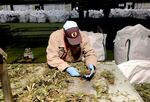
Hemp Inc. employee Frank Van Pelt sorts out moldy hemp plants at the White City warehouse.
Erik Neumann
Lawmakers in Oregon are trying to regulate a lesser-known compound derived from cannabis. It’s an artificially derived product from hemp that produces a high but which is sold with few restrictions.
House Bill 3000 targets the compound known as Delta-8-THC that’s extracted from hemp. Right now, processors can extract CBD from hemp. It’s then used in countless health products. But CBD can be further chemically processed to get Delta 8, which has mild intoxicating effects.
“You grow high-CBD hemp, you take that hemp, process it into CBD – okay, so far no problem,” says Rep. Marty Wilde. “But then you process the CBD with chemicals to make it into an intoxicating product. Right now, that’s arguably not prohibited.”
Delta 8 is less potent than marijuana, but can be sold to minors in CBD products. And since it comes from hemp, which is treated as an agricultural product and regulated by the Oregon Department of Agriculture, it’s subject to minimal regulations.
Rep. Wilde, D-Eugene, and Rep. Lily Morgan, R-Grants Pass, are pushing legislation to study artificially-derived cannabis compounds and regulate them more like conventional marijuana under Oregon Liquor Control Commission.
“The idea is not putting people out of business,” Morgan says. “The idea is to encourage people to go through the lawful path that has the appropriate regulation for that. And that intoxicants are not getting to kids and that we’re not undermining those that are doing the process right with people that are bypassing the legal methodology.”
Committee testimony from cannabis growers was largely critical of the legislation. They’re concerned it will result stricter regulations on the hemp industry.
According to the Oregon Liquor Control Commission, there’s little historical information about consumption of Delta 8 compounds and because of their subtle difference from other CBD products, it’s hard for consumers to know what they’re buying.
“If you want to grow hemp for food or fiber, that’s fine. That’s what ODA’s licensing process is for,” Wilde says. “If you want to grow things for intoxicating chemicals, and process them into intoxicating chemicals, that’s an OLCC process.”